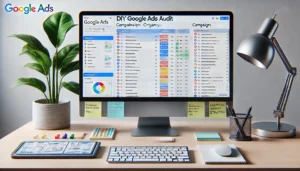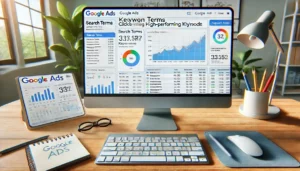Is Your Google Ads Account a Black Box? A Free Guide to DIY Google Ads Audits for Busy UK Businesses

Running Google Ads can sometimes feel like a mystery. Are you getting the most out of your budget? Are your ads reaching the right people? This guide will help you with DIY Google Ads audits, so you can take control and improve your results.
Key Takeaways
- Understand the key elements of a Google Ads audit.
- Learn how to set clear goals for your ad campaigns.
- Discover ways to improve your ad performance and quality scores.
- Find out how to manage your budget and bids effectively.
- Get tips on analysing competitor strategies and benchmarking your performance.
A Free Guide to DIY Google Ads Audits: Understanding the Basics
What is a Google Ads Audit?
A Google Ads audit is a thorough review of your Google Ads account. We look at everything from your campaign structure to your ad performance. This helps us find areas that need improvement. Regular audits ensure your ads are working as they should.
Why Regular Audits are Crucial (A Free Guide to DIY Google Ads Audits)
Regular audits are key to keeping your ads effective. They help us spot issues early and fix them before they become big problems. This way, we can make sure your ads are always performing at their best. Audits also help us stay on top of changes in the ad platform.
Common Pitfalls in Google Ads Management
Managing Google Ads can be tricky. There are common mistakes that many businesses make. These include poor keyword choices, bad ad copy, and not using negative keywords. By avoiding these pitfalls, we can improve your ad performance and get better results.
A Free Guide to DIY Google Ads Audits: Setting Clear Objectives
Defining Your Business Goals
Before diving into the audit, we need to clearly define our business goals. Are we aiming to increase sales, generate leads, or boost brand awareness? Knowing our goals helps us tailor our audit to meet these specific needs.
Aligning Ads with Objectives (A Free Guide to DIY Google Ads Audits)
Once our goals are set, the next step is to ensure our ads align with these objectives. This means checking if our ad copy, keywords, and landing pages are all working together to achieve our desired outcomes. Consistency is key here.
Measuring Success Metrics
Finally, we need to decide how we’ll measure success. This could be through click-through rates, conversion rates, or return on ad spend. By setting clear metrics, we can easily track our progress and make necessary adjustments.
Setting clear objectives is the foundation of a successful Google Ads audit. It ensures that every aspect of our campaign is aligned and working towards our business goals.
A Free Guide to DIY Google Ads Audits: Evaluating Your Google Ads Account Structure
Campaign Organisation
When we talk about campaign organisation, we mean how your campaigns are set up within your Google Ads account. A well-structured campaign can make a huge difference in your ad performance. Proper organisation helps in managing budgets, targeting, and performance tracking more effectively. For instance, separating campaigns by product categories or services can provide clearer insights and better control over your Google AdWords PPC efforts.
Ad Group Relevance (A Free Guide to DIY Google Ads Audits)
Ad groups should be tightly themed. This means that the keywords, ads, and landing pages within each ad group should be closely related. If your ad groups are too broad, your ads may not be as relevant to the search queries, which can lower your Quality Scores. By focusing on ad group relevance, we can ensure that our ads are more targeted and effective.
Keyword Grouping Strategies
Grouping your keywords strategically is crucial for the success of your Google Ads campaigns. We should group keywords that share a common theme or intent. This not only improves ad relevance but also helps in better budget allocation and performance tracking. For example, using long-tail keywords in specific ad groups can help in capturing more qualified leads.
Remember, a well-structured Google Ads account is not just about setting up campaigns and ad groups; it’s about ongoing management and optimisation. Regular audits can help identify areas for improvement and ensure that your account is performing at its best.
By following these steps, we can make our Google Ads account less of a black box and more of a well-oiled machine. This will not only improve our ad performance but also provide us with deeper insights into our marketing efforts.
A Free Guide to DIY Google Ads Audits: Analysing Ad Performance and Quality Scores
Understanding Quality Scores
Quality Scores are crucial for your Google Ads. They affect your ad’s visibility and cost. A higher score means better ad placement and lower costs. We need to focus on improving these scores to get the most out of our budget.
Improving Ad Relevance (A Free Guide to DIY Google Ads Audits)
Ad relevance is about how closely your ad matches the user’s search intent. If your ad is highly relevant, it will likely get more clicks. This is where we can make a big impact. By tweaking our ad copy and keywords, we can ensure our ads are more aligned with what users are searching for.
Optimising Click-Through Rates
Click-Through Rate (CTR) is a key metric. It shows how often people click on your ad after seeing it. A higher CTR means your ad is engaging and relevant. To boost CTR, we can experiment with different headlines, descriptions, and calls to action. Small changes can lead to big improvements.
Regularly reviewing and adjusting our ads can significantly enhance their performance and quality scores.
A Free Guide to DIY Google Ads Audits: Keyword Analysis and Optimisation Techniques
Identifying High-Performing Keywords
To get the most out of your Google Ads, we need to identify which keywords are driving the best results. Start by looking at your search terms report. This report shows the actual terms people are using to find your ads. Focus on keywords with high click-through rates (CTR) and conversions. These are your high-performing keywords. Regularly updating your keyword list ensures you stay relevant and competitive.
Negative Keyword Strategies (A Free Guide to DIY Google Ads Audits)
Negative keywords are just as important as positive ones. They prevent your ads from showing up for irrelevant searches. For example, if you sell luxury watches, you might want to add “cheap” as a negative keyword. This way, your ad won’t show up for people looking for cheap watches. Regularly review and update your negative keyword list to avoid wasting your budget on unqualified traffic.
Using Keyword Tools Effectively
There are many tools available to help with keyword research. Google Keyword Planner is a great starting point. It provides data on search volume, competition, and suggested bid estimates. Other tools like SEMrush and Ahrefs offer additional insights. Use these tools to find new keyword opportunities and to refine your existing list. Remember, the right keywords can make or break your campaign.
Effective keyword management is crucial for a successful Google Ads campaign. By focusing on high-performing keywords, using negative keywords wisely, and leveraging keyword tools, we can optimise our ads for better performance.
A Free Guide to DIY Google Ads Audits: Budget Management and Bid Strategies
Setting a Realistic Budget
When it comes to managing your Google Ads, setting a realistic budget is crucial. We need to ensure that our spending aligns with our business goals. Overspending can quickly drain resources, while underspending might limit our reach. It’s all about finding that sweet spot.
Automated vs Manual Bidding (A Free Guide to DIY Google Ads Audits)
Choosing between automated and manual bidding can be tricky. Automated bidding uses Google’s algorithms to optimise bids, saving us time. However, manual bidding gives us more control. We can adjust bids based on our unique insights and business needs.
Adjusting Bids for Better ROI
To get the best return on investment (ROI), we must regularly adjust our bids. This means increasing bids for high-performing keywords and reducing them for underperforming ones. A well-managed bid strategy can significantly improve our PPC management efforts.
Regularly reviewing and adjusting bids is essential for maximising ROI and ensuring our ads perform at their best.
A Free Guide to DIY Google Ads Audits: Ad Copy and Creative Review
Crafting Compelling Ad Copy
Creating engaging ad copy is essential for any successful Google Ads campaign. We need to ensure our ads are not only eye-catching but also relevant to our target audience. A well-crafted ad can significantly boost your click-through rates (CTR) and overall campaign performance. As a PPC agency, we focus on using strong calls to action and highlighting unique selling points to make our ads stand out.
A/B Testing Ad Variations (A Free Guide to DIY Google Ads Audits)
A/B testing is a powerful method to determine which ad variations perform best. By testing different headlines, descriptions, and calls to action, we can identify what resonates most with our audience. This process helps us refine our ads and improve their effectiveness over time. Remember, continuous testing and optimisation are key to staying ahead in the competitive landscape of PPC advertising.
Using Extensions to Enhance Ads
Ad extensions are a great way to provide additional information and increase the visibility of our ads. They can include site links, callouts, and structured snippets, among others. By leveraging ad extensions, we can make our ads more informative and appealing, which can lead to higher engagement and conversion rates. As a London PPC agency, we always recommend using relevant ad extensions to maximise the impact of your campaigns.
Regularly reviewing and updating your ad copy and creative elements is crucial for maintaining a high-performing Google Ads account. Don’t let your ads become stale; keep them fresh and relevant to your audience’s needs.
In summary, focusing on crafting compelling ad copy, conducting A/B tests, and utilising ad extensions can significantly enhance the performance of your Google Ads campaigns. As a leading PPC ecommerce agency, we understand the importance of these elements in driving success for our clients.
A Free Guide to DIY Google Ads Audits: Landing Page Experience and Conversion Tracking
Ensuring Landing Page Relevance
We need to make sure our landing pages match the ads that bring visitors to them. If someone clicks on an ad about ecommerce PPC, they should land on a page that talks about ecommerce PPC. This keeps visitors happy and more likely to stay.
Improving User Experience (A Free Guide to DIY Google Ads Audits)
A good user experience is key. Our landing pages should load quickly, be easy to navigate, and look good on all devices. A slow or confusing page can drive visitors away.
Setting Up Conversion Tracking
Conversion tracking helps us see what actions visitors take on our site. We can track things like purchases, sign-ups, or downloads. This data is crucial for understanding how well our ads are working and where we can improve.
By focusing on landing page relevance, user experience, and conversion tracking, we can make sure our Google Ads are as effective as possible.
A Free Guide to DIY Google Ads Audits: Leveraging Google Analytics for Deeper Insights
Integrating Google Ads with Analytics
To get the most out of your Google Ads, it’s essential to link your account with Google Analytics. This integration allows us to track user interactions and understand how our ads are performing. By connecting these platforms, we can see which ads drive the most traffic and conversions.
Tracking User Behaviour (A Free Guide to DIY Google Ads Audits)
Once integrated, we can dive into user behaviour. We can see how visitors interact with our site after clicking on an ad. This includes pages visited, time spent on each page, and actions taken. This data helps us identify which parts of our site are working well and which need improvement.
Using Data to Inform Decisions
With all this information at our fingertips, we can make informed decisions about our ad campaigns. We can adjust our strategies based on what’s working and what’s not. This ensures that our ads are always optimised for the best possible performance.
Leveraging Google Analytics is a game-changer for any business looking to improve their Google Ads performance. It provides valuable insights that can help us make smarter decisions and achieve better results.
A Free Guide to DIY Google Ads Audits: Competitor Analysis and Benchmarking
Identifying Key Competitors
To start, we need to identify our main competitors. This involves looking at businesses that offer similar products or services. We can use tools like Google Ads’ Auction Insights to see who we’re up against. Knowing our competitors helps us understand the market landscape better.
Analysing Competitor Strategies (A Free Guide to DIY Google Ads Audits)
Next, we dive into analysing their strategies. What keywords are they targeting? How are their ads structured? By examining these elements, we can find gaps in their approach and opportunities for us. Understanding their strengths and weaknesses allows us to refine our own strategies.
Benchmarking Your Performance
Finally, we benchmark our performance against theirs. This means comparing key metrics like click-through rates (CTR), conversion rates, and ad spend. A simple table can help us keep track:
| Metric | Our Business | Competitor A | Competitor B |
|---|---|---|---|
| CTR | 2.5% | 3.0% | 2.8% |
| Conversion Rate | 1.8% | 2.2% | 1.9% |
| Ad Spend | £500 | £600 | £550 |
Regularly updating this table helps us stay competitive and make informed decisions.
By following these steps, we can ensure our Google Ads campaigns are always a step ahead of the competition.
A Free Guide to DIY Google Ads Audits: Creating an Actionable Audit Report
Summarising Key Findings
First, we need to summarise the key findings from our Google Ads audit. This involves identifying the strengths and weaknesses in our current campaigns. Highlighting these areas will help us understand where we need to focus our efforts.
Prioritising Action Items (A Free Guide to DIY Google Ads Audits)
Next, we should prioritise the action items based on their impact and urgency. Here’s a simple way to do it:
- High Impact, High Urgency
- High Impact, Low Urgency
- Low Impact, High Urgency
- Low Impact, Low Urgency
This method ensures that we tackle the most critical issues first.
Implementing Changes and Monitoring Results
Finally, we need to implement the changes and monitor the results. Use tools like Google Analytics to track the performance of your updated campaigns. Regular monitoring will help us make necessary adjustments and improve our ROI over time.
An actionable audit report is essential for continuous improvement and achieving better results in your Google Ads campaigns.
Creating an actionable audit report is key to improving your PPC campaigns. Our team at PPC Geeks can help you understand your current performance and identify areas for improvement. Don’t miss out on our free, detailed PPC audit. Visit our website to get started today!
Conclusion
In conclusion, taking control of your Google Ads account doesn’t have to be a daunting task. With the right tools and a bit of guidance, you can perform your own audits and make informed decisions to improve your campaigns. Remember, the key is to stay curious and proactive. By regularly reviewing and tweaking your ads, you’ll not only save money but also achieve better results. So, don’t let your Google Ads account remain a mystery. Start your DIY audit today and see the difference it can make for your business.
Frequently Asked Questions
What is a Google Ads audit?
A Google Ads audit is a thorough review of your Google Ads account. It helps you find out what’s working well and what needs fixing. This way, you can get the most out of your ad spend.
Why should I do regular Google Ads audits?
Regular audits help you keep your ads running smoothly. They let you spot problems early and fix them before they cost you money. Plus, they help you stay ahead of your competitors.
What are some common mistakes in Google Ads management?
Some common mistakes include not using negative keywords, poor ad copy, and not tracking conversions. These errors can waste your budget and lower your ad performance.
How do I set goals for my Google Ads audit?
Start by deciding what you want to achieve with your ads. Do you want more sales, more website visits, or something else? Once you know your goals, you can check if your ads are helping you reach them.
What should I look at when checking my Google Ads account structure?
Look at how your campaigns and ad groups are organised. Make sure they are set up in a way that makes sense for your business. Also, check if your keywords are grouped well.
How can I improve my ad performance and quality score?
You can improve your ad performance by writing better ad copy and using relevant keywords. To boost your quality score, make sure your ads match what users are looking for and lead to useful landing pages.
What is the best way to manage my Google Ads budget?
Set a budget that you can afford and that matches your goals. You can use automated bidding to save time, but manual bidding gives you more control. Adjust your bids based on what works best.
How do I track conversions in Google Ads?
Set up conversion tracking in your Google Ads account. This will help you see which ads are leading to sales or other important actions. It’s a key part of measuring your ad success.
Author
Search Blog
Free PPC Audit
Subscribe to our Newsletter
The Voices of Our Success: Your Words, Our Pride
Don't just take our word for it. With over 100+ five-star reviews, we let our work-and our satisfied clients-speak for us.
"We have been working with PPC Geeks for around 6 months and have found Mark and the team to be very impressive. Having worked with a few companies in this and similar sectors, I rate PPC Geeks as the strongest I have come across. They have taken time to understand our business, our market and competitors and supported us to devise a strategy to generate business. I value the expertise Mark and his team provide and trust them to make the best recommendations for the long-term."
~ Just Go, Alasdair Anderson




